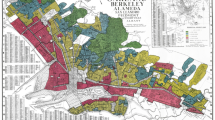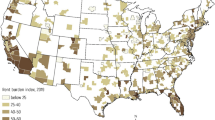Abstract
This paper deals with the social impact of the 2008 global economic crisis on urban Turkey. Empirical evidence drawn from recently collected survey data using a multi-stage, stratified, random cluster sample illustrates the extent to which the economic crisis was also a social crisis. Analyses of three different levels—the neighborhood, household, and individual—highlight multiple detrimental effects, as seen in increased neighborhood social problems, household economic hardship and associated coping strategies, and individual mental and physical health problems. While post-crisis economic hardship, as measured by job loss, earnings reduction, and underemployment, was wide-spread, lower socioeconomic groups, renters, and Kurdish households suffered more. Economic hardship was also associated with a range of household coping strategies, both of which represent potential longer-term secondary social impacts, particularly in the Turkish context, when government safety nets are weak and families are left to fend for themselves. If appropriate measures are not taken, the long-term effects may go beyond the current generation of workers to affect the future wellbeing of vulnerable groups.

Similar content being viewed by others
References
Allen, R. (2013). The distribution and evolution of physical neighborhood problems during the great recession. City & Community, 12(3), 260–279.
Aytaç, I., & Rankin, B. (2008). Unemployment, economic strain, and family distress: The impact of the 2001 economic crisis. New Perspectives on Turkey, 38, 181–203.
Aytaç, I., & Rankin, B. (2009). Economic crisis and marital problems in Turkey: A test of the family stress model. Journal of Marriage and Family, 71, 756–767.
Babbie, E. R. (1973). Survey research methods. Belmont, CA: Wadsworth.
BBC World Service Poll. (2009). Economic system needs major changes: Global poll. March 31, 2009. http://www.worldpublicopinion.org/pipa/pdf/mar09/BBCEcon_Mar09_rpt.pdf.
Buğra, A., & Keyder, Ç. (2003). New poverty and the changing welfare regime of Turkey. Report prepared for the United Nations Development Program.
Ching, F. (2000). Social impact of the regional financial crisis. In The Asian economic crisis: Policy choices, social consequences and the Philippine case. Asian society. http://www.asiasociety.org/publications/update_crisis_ching.html.
Cohen, S., Kamarch, T., & Mermelstein, R. (1983). A global measure of perceived stress. Journal of Health and Social Behavior, 24(4), 385–396.
Conger, R. D., Elder, G. H., Lorenz, F. O., & Simons, R. L. (1994). Economic stress, coercive family process, and developmental problems of adolescents. Child Development, 65, 541–561.
Conger, R. D., Elder, G. H., Lorenz, F. O., Simons, R. L., Whitbeck, L. B., Huck, S., et al. (1990). Linking economic hardship to marital quality and instability. Journal of Marriage and Family, 52, 643–656.
Conger, R. D., Reuter, M. A., & Elder, G. H, Jr. (1999). Couple resilience to economic pressure. Journal of Personality and Social Psychology, 76, 54–71.
Elliott, D. S., Wilson, W. J., Huizinga, D., Sampson, R. J., Elliott, A., & Rankin, B. (1996). The effects of neighborhood disadvantage on adolescent development. Journal of Research in Crime and Delinquency, 33, 389–426.
Erdoğan, N. (2002). Yoksulluk halleri: Türkiye’de kent yoksulluğunun toplumsal görünümleri. Istanbul: Demokrasi Kitaplığı Yayınevi.
Eyüboğlu, A., Özar, Ş., & Tufan-Tanrıöver, H. (1998). Kentli kadınların çalışma koşulları ve çalışma yaşamını terk nedenleri. İktisat Dergisi, 377, 37–43.
Fiszbien, A., Giovagnoli, P., & Aduriz, I. (2002). Argentina’s crisis and its impact on household welfare. Argentina Poverty Update 2003, Background Paper No. 1.
Hraba, J., Lorenz, F. O., & Pechacova, Z. (2000). Family stress during the Czech transformation. Journal of Marriage and the Family, 62, 520–531.
İlkkaracan, İ. (1998). Kentli kadınlar ve çalışma yaşamı. Bilanço 98: 75 yılda kadınlar ve erkekler (pp. 285–302). İstanbul: Tarih Vakfı.
International Monetary Fund (IMF). (2009). From recession to recovery: How soon and how strong? Chapter 3. In World economic outlook crisis and recovery, April 2009. Washington, DC: IMF.
Jargowsky, P. A. (1996). Poverty and place: Ghettos, barrios, and the American city. New York: Russell Sage Foundation.
Kasarda, J. (1989). Urban industrial transition and the urban underclass. Annals of the American Academy of the Political and Social Sciences, 501, 26–47.
Kinnunen, U., & Pulkkinen, L. (1998). Linking economic stress to marital quality among finnish marital couples: Mediator effects. Journal of Family Issues, 19, 705–720.
Kwon, H., Rueter, M. A., Lee, M., Koh, S., & Ok, S. W. (2003). Marital relationships following the Korean economic crisis: Applying the family stress model. Journal of Marriage and Family, 65, 316–325.
Milliyet. (2009). Kriz teğet geçti dedim, etkilemedi demedim, April 3.
Mingione, E. (1996). Urban poverty in the advanced industrial world: Concepts, analysis, and debates. In E. Mingione (Ed.), Urban poverty and the underclass: A reader. Cambridge, Mass: Blackwell.
Moser, C. (1996). Confronting crisis: A summary of household responses to poverty and vulnerability in four poor urban communities. Environmentally sustainable development studies and monograph series no. 7. Washington, DC: The World Bank.
Öniş, Z. (2003). Domestic politics versus global dynamics: Towards a political Economy of the 2000 and 2001 Financial Crises in Turkey. In Z. Öniş & B. Rubin (Eds.), The Turkish economy in crisis. London: Frank Cass.
Radikal. (2009). Subat 2009’a kadar alti ayda 500 bin kisi isten atildi, April 8.
Radloff, L. S. (1979). The CESD-D scale: A self-report depression scale for research in the general population. Applied Psychological Measurement, 1, 385–401.
Rankin, B. (2011). Economic crises and the social structuring of economic hardship: The impact of the 2001 Turkish crisis in comparative perspective. New Perspectives on Turkey, 44, 11–40.
Sampson, R. J., Stephen, R., & Felton, E. (1997). Neighborhoods and violent crime: A multilevel study of collective efficacy. Science, 277, 918–924.
Şenses, F. (2003). Economic crisis as an instigator of distributional conflict: The Turkish case in 2001. In Z. Öniş & B. Rubin (Eds.), The Turkish economy in crisis (pp. 92–119). London: Frank Cass.
Sönmez, M. (2002). 100 göstergede kriz ve yoksullaşma. Istanbul: İletişim Yayınları.
Sussangkarn, C., Flatters, F., & Kittiprapas, S. (1999). Comparative social impacts of the Asian economic crisis in Thailand, Indonesia, Malaysia, and the Philippines: a preliminary report. TDRI Quarterly Review, 14(1), 3–9.
Tekcan, A. (2006). Turkey’s collective memories. Unpublished manuscript.
Thomas, D., & Frankenberg, E. (2005). Household response to the financial crisis in Indonesia: Longitudinal evidence on poverty, resources and well-being. California Center for Population Research, On-line Working Paper Series, CCPR-05605.
Tunalı, İ. (2003). Background study on labor market and employment in Turkey. Prepared for the European Training Foundation, Torino, Italy.
Turkstat. (2008). Turkish Statistical Institute Press Release, No. 99, June 16, 2008.
Turkstat. (2009). Turkish Statistical Institute, Press Release, No. 38, March 16.
Turkstat. (2011). Turkish Statistical Institute, Household Labor Force Research Press Release, No. 228, November 15, 2011.
Verick, S. (2009). Who is hit hardest during a financial crisis? The vulnerability of young men and women to unemployment in an economic downturn. International Labor Organization (ILO) and IZA Discussion Paper No. 4359, August 2009.
Wilson, W. J. (1987). The truly disadvantaged: the inner city, the underclass and public policy. Chicago: The University of Chicago Press.
World Bank. (2001). Argentina household risk, self-insurance and coping strategies in urban Argentina. Report No. 22426-AR.
World Bank (2003). Turkey: Poverty and coping after crisis. Report No. 24185-TR.
TEPAV, UNICEF & World Bank. (2009). Ekonomik Kriz Türkiye’de ailelerin Refahını Etkiliyor. http://www.tepav.org.tr/upload/files/haber/1256049740r6571.RefahIzleme_Anketi_Ozeti.pdf.
Acknowledgments
Support for this research was provided by Boğaziçi University Research and Development Fund (AR-GE Fund), Social Policy Forum and State Planning Office (DPT) Fund (2010k120670), and Scientific Research Fund (BAP09B801P). We would like to thank Yönelim Research Company for data collection and preparation.
Author information
Authors and Affiliations
Corresponding author
Appendix
Rights and permissions
About this article
Cite this article
Aytaç, I.A., Rankin, B.H. & İbikoğlu, A. The Social Impact of the 2008 Global Economic Crisis on Neighborhoods, Households, and Individuals in Turkey. Soc Indic Res 124, 1–19 (2015). https://doi.org/10.1007/s11205-014-0769-5
Accepted:
Published:
Issue Date:
DOI: https://doi.org/10.1007/s11205-014-0769-5




